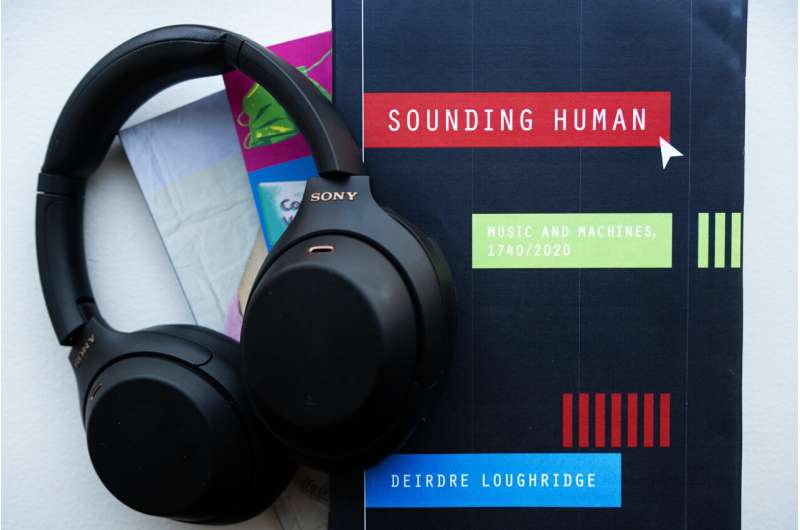This article has been reviewed according to Science X's editorial process and policies. Editors have highlighted the following attributes while ensuring the content's credibility:
fact-checked
trusted source
proofread
Human or machine? How about both? New book explores the line between man and machine in music

When Deirdre Loughridge first began teaching classes on music technology in 2012, there was a lot of talk about how computers were "dehumanizing" music. The general thought among her students then was that computers could not make music.
But over the years, Loughridge, an associate music professor at Northeastern University who specializes in the history of music technology, noticed a shift in this attitude.
"When I started teaching, it was very prevalent to be surprised and disturbed by the idea that a computer could make music," she said. "But five years later, that started to seem like a much more common idea for students. It seemed more intuitive to them to think about making music with a computer."
With the rise of artificial intelligence, there's been an increasing number of conversations surrounding AI and art, and whether the work we're enjoying is from a human or a machine. But the answer, Loughridge says, is not always so simple, at least not when it comes to music. After all, a computer-generated piece in the style of Chopin was created by human programmers and Chopin composed with a piano that is also sort of a machine.
This is the example Loughridge uses to open her upcoming book, "Sounding Human." The December release was inspired by the shift in attitude Loughridge has seen over her career, and explores how the human and machine have been pitted as both oppositional forces and working pairs.
"It's responding to a habit of thought in a lot of music spaces and outside of music as well that sees framing as always human or machine," she said. "The book is trying to get out of this binary bifurcation of human and machine to explore how they have been entangled, how they relate to each other, and what it opens up for us to think about those relationships rather than get stuck on a human or machine question."
In the book, Loughridge explores this debate and how it played out from 1740 until 2020, starting with the advent of an android-like device that plays the flute and ending with musicians experimenting with machine learning.
During the 1700s, music was considered "highly rational" and the use of machines in creating this art was normal, Loughridge said. But over the subsequent centuries, attitudes changed toward music being something that was expressive and "antithetical to machines," as Loughridge puts it, sparking debate over technological advances like adding valves to horns.
"There's a waxing and waning of the attitude towards how machines related to human musicality," she said. "You can find lots of examples of the reaction to technological change."
The subject matter is particularly poignant as there's more debate around AI. The conversation has evolved even over the last year, Loughridge said, with more people viewing the use of this type of technology as either "good" or "bad." But looking through the history in her book can provide greater context to these conversations.
"With the book, I really tried to explore examples that are at the edges of or challenge that kind of human or machine framing, to provide a history that allows us to see … that there have been many ways of understanding what machines are, what can we do with them, how they relate to us, and how they impact us. There's a history there that can help us imagine other futures (so far as) what we'll do with AI."




















